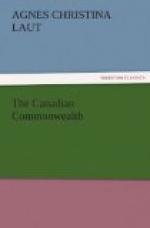Canadians do not believe that “I-am-as-good-as-you-are-and-a-little-better.” They will accept the fact that “I-am-as-good-as-you-are” only when I prove it in brain, in brawn, in courtesy, in mental agility, in business acumen, in service—in a word, in fact. They are comparatively untouched by the theoretical radicalism of the French Revolution, by the socialism of a Lloyd George, by the war of labor and capital. They are untouched by theory because they are so intent on fact. The “liberty, equality and fraternity” cry of the French Revolution—they regard as so much hot air. Canadians since 1837 have had “liberty, equality, fraternity.” Why rant about it? And when they didn’t have it, they fought for it and went to the scaffold for it, and got it. The day’s work—that’s all. Why posturize and theorize about platitudes? Canadians are not interested in the Lloyd George theory of the poor plundering the prosperous, because every man or woman who tries in Canada can succeed. He may hoe some long hard rows. Let him hoe! It will harden flabby muscle and give backbone in place of jawbone! Help the innocent children—yes! There is a child saving organization in every province. But if the adult will not try, let him die! If he will not struggle to survive, let him die! The sooner the better! No theoretical parasites for Canada, nor parlor socialism! “Take off your coat! Roll up your shirt-sleeves! Stop blathering! Go to work!” says Canada.
“But I think—” protests the theorist.
“Thinks don’t pass currency as coin. Go to work, and pass up facts,” says Canada.
VI
It may be objected that all this means the survival of the fit, the rule of the many by the few. That is exactly what it means. That is the fountain spring of Canada’s national idea, whether we like it or hate it. That is the belief that binds Canada’s loyalty to the monarchical idea—though Canada would as soon call it the presidential idea as the monarchical idea. She does not care what name you tag it by so long as she delegates to the selected and elected few the power to rule. She believes the selected few are better than the unwinnowed many as rulers. She would sooner have a mathematical school-teacher as finance minister than a saloon keeper or ward heeler. She believes that the rule of the select few is better than the rule of the thoughtless many. She delegates the right and power to rule to those few, lets them make the laws and bows to the laws as to the laws of God, as the best possible for the nation because they have been enacted by the best of her nation. If that best be bad, it is at least not so bad as the worst. She never says—“Pah! What is law! I made the law! If it doesn’t suit me, I’ll break it. I am the law.”




